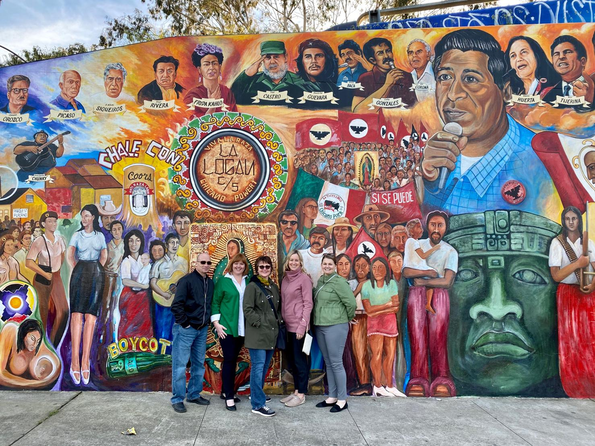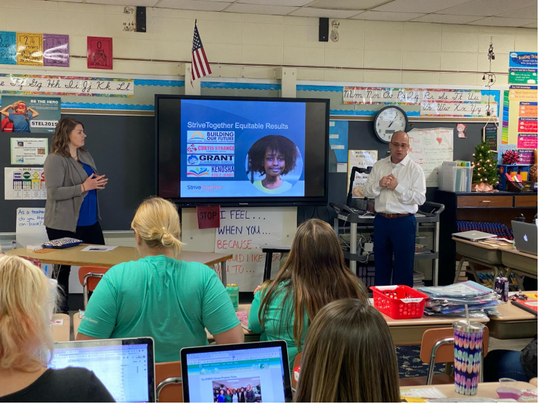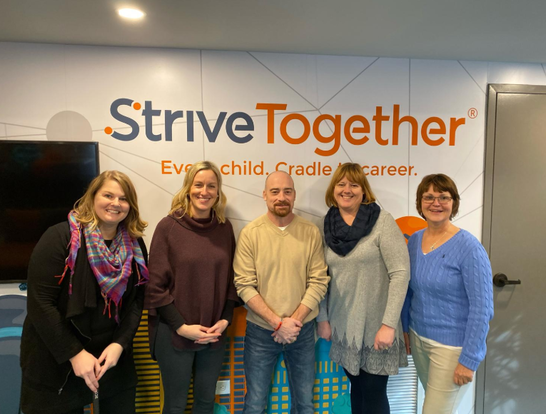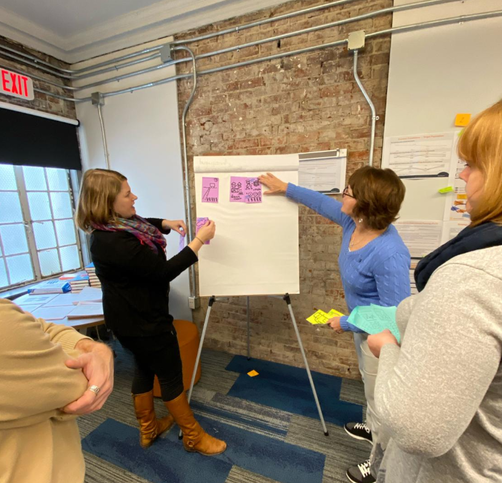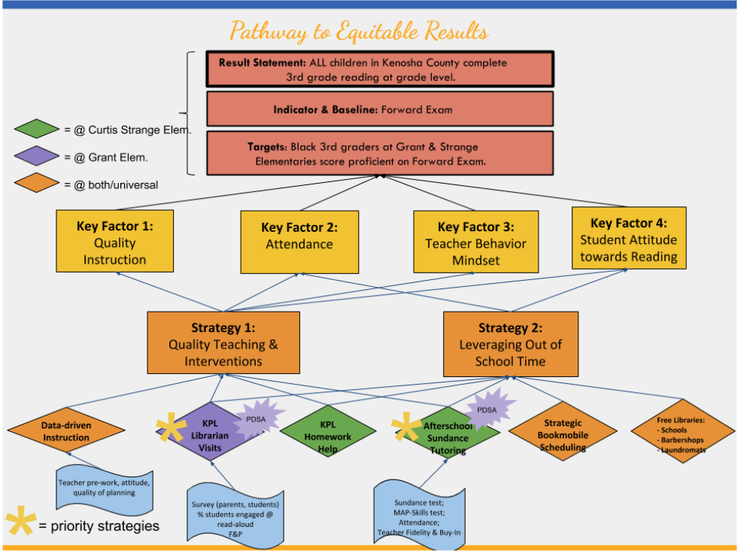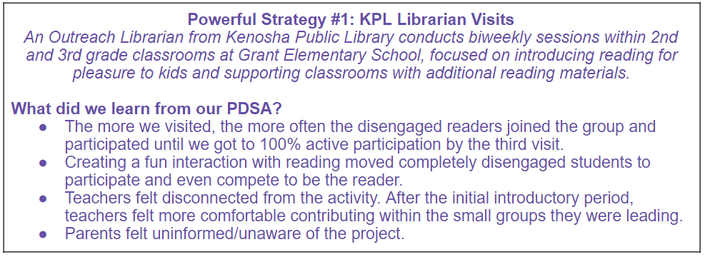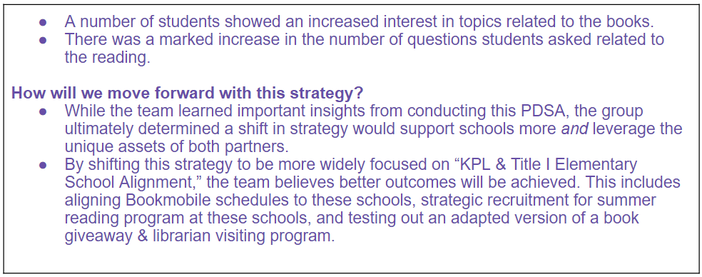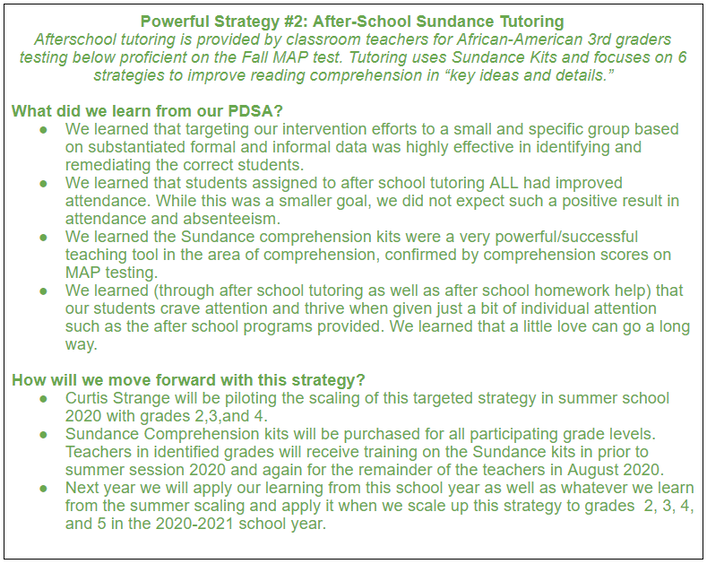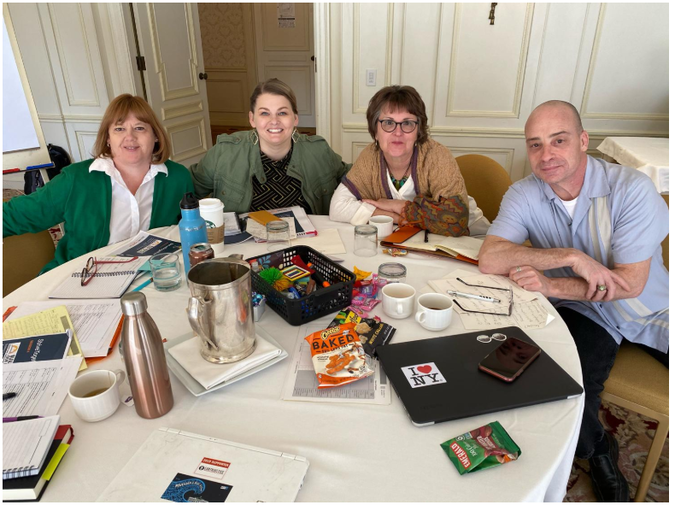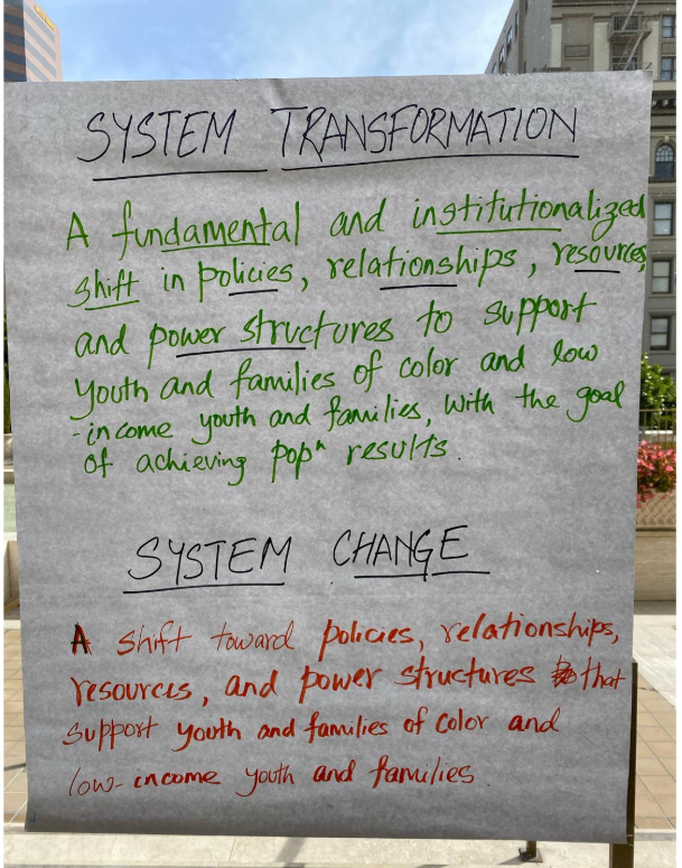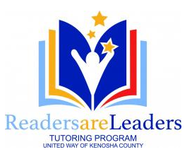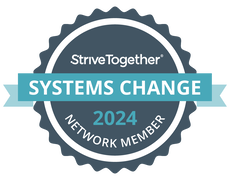|
“For things to change, somebody somewhere has to start acting differently. Maybe it’s you.”
In 2019, Building Our Future was offered the opportunity for a team of backbone staff and partners to be part of StriveTogether’s Equitable Results Series, an intensive 10-month program designed to equip us as leaders with skills in Annie E. Casey’s Results Count™* framework, including adaptive leadership, holding accountability for equitable results, and using oneself as an instrument of change. This is the second article in a 2-part series (part 1 here). In partnership with the Kenosha Public Library (KPL) and Kenosha Unified School District (KUSD), our team set out to improve early grade reading outcomes and decrease racial disparities at two focus elementary schools: Curtis Strange Elementary and Grant Elementary. In hindsight, I think we all hoped that a silver bullet would be revealed to us - a secret key that we had been missing somehow. Even though we had, collectively between the five of us, over a century of experience in the fields of education, community change, and nonprofit leadership, we hoped the answer to the most pressing challenge of our time would be a simple missing puzzle piece that would put things perfectly into perspective. In the process of rolling up our sleeves and getting into the deep work that is required of systems change and racial equity work, we realized there was no silver bullet. Nevertheless, we learned a lot along the way, built trust and relationship, and grew our individual and group capabilities to more effectively take up collective impact racial equity work. Start small, think big. As leaders, we must strive for large-scale, systemic changes that will lead to transformational improvements in student outcomes, ensuring that ALL children have access to a bright future. While yes, that large-scale change needs to happen, we must start small to ensure 1) we are working on the correct factor in the first place, and 2) we are moving results in the right direction. “Starting small” here means:
By taking the time to learn when things are on a small-scale, we can more easily adapt and refine strategies early on, allowing for quicker scale-up in the long-term. Address multiple levels. We must start small. But we also must be prepared to simultaneously address multiple levels of the systems we’re operating in, and more specifically, be prepared to address the multiple levels of racism within those systems. This means having strategies that target both the micro-level, such as internalized narratives or interpersonal bias, and the macro-level, such as institutional policies and structural racism. You can’t work towards racial equity without an explicit focus on race. This might sound odd coming from a team of five White people. After all, isn’t talking about race super uncomfortable? Can’t we focus on economic disparities instead? In short, no. We believe that racial disparities will start to improve when, and only when, we formally acknowledge the significant role race plays in American society and in the outcomes we see today. Furthermore, we must accept that every system is perfectly designed to get the results it gets. That means grappling with the idea that our systems--educational, workforce, healthcare, economic--are all set up to get its current results. In order to focus on race, we must enact targeted strategies that, when called for, are racialized, and do this in partnership with those who are most affected. Equity is an adaptive challenge. Unlike technical challenges, which have known solutions and can easily be solved by someone in charge, adaptive challenges don’t come with a manual. Solving the racial disparities in our community will happen only when the people involved create the solution together. That meant shedding some ego, examining our deeply held beliefs about who is the “expert” and who is qualified to work on the challenge, and leaning into discomfort. For our group, it’s also meant that we’ve needed to wade through unclear roles and clarify them, we’ve had to approach the challenge non-traditionally and across organizational borders, and we’ve also had to be okay with the unknown. Overall, I believe this experience of grappling with the unknown of adaptive challenges has built incredible stamina and resilience in our team, for this specific work but also for our wider work in general. Shared performance measures keep you focused. Obviously, the entire education world has shifted to data, data, data, so how are shared performance measures any different? Our focus on shared performance measures in Equitable Results helped us think about the “smaller” data that we could be collecting. What are the signposts we’ll look for along the way that tell us we’re moving in the right direction? These could be quantitative or qualitative, assessment data or observational data. For example, while we know that we’re aiming for improved results on the Forward exam, this exam is taken one time per school year, and for the first time for a student in third grade. This means that unless we’re looking at shared performance measures along the way, such as attendance, improvement on a weekly MAP Skills assessment, and qualitative data around parent trust, we won’t know if we’re on the way or off course. It’s a bit like using a GPS system that can see the destination but not your current location. This work, obviously, all took place pre-COVID. Given the changes and stresses our community has undergone in the last couple months, we know there will be a new normal. We know these strategies will need to shift and reshape in order to support our students and families. We also know that out of crisis can come innovation, and there is, now more than ever, an increasing urgency around changing our systems so they work for ALL children. The learnings we took from this program were not around specific strategy, but rather are around process to determine the strategies. Using this process, with fidelity, will help our community to find a new normal grounded in equity. *Results Count™ is grounded in two frameworks:
In 2019, Building Our Future was offered the opportunity for a team of backbone staff and partners to be part of StriveTogether’s Equitable Results Series, an intensive 10-month program designed to equip us as leaders with skills in Annie E. Casey’s Results Count™* framework, including adaptive leadership, holding accountability for equitable results, and using oneself as an instrument of change. This is the first article in a 2-part series. In partnership with the Kenosha Public Library (KPL) and Kenosha Unified School District (KUSD), our team set out to improve early grade reading outcomes and decrease racial disparities at two elementary schools: Curtis Strange Elementary and Grant Elementary. By joining forces and leveraging different organizational strengths, our team's challenge was to demonstrate how, by focusing on data, continuous improvement, and adaptive leadership, we could start to move the needle in literacy outcomes at a student- and school-level. Before deciding what we would do, we had to start with the big result-- ALL children in Kenosha County complete 3rd grade reading at grade level. From there, we set a goal: 50% of 3rd graders overall at Grant Elementary & Curtis Strange Elementary score proficient in the 2020 Forward exam ELA (English-Language Arts), with 50% of Black 3rd graders scoring proficient. This goal was set using the idea of Targeted Universalism--that in order to move a population level results, we must target strategies towards the groups that are disproportionately burdened by the system, while also enacting universal strategies that will lead to changing systems so they work for all students. Although ambitious, StriveTogether guided our team to identify and refine strategies to meet this target over the course of the program by continually naming and validating factors with families, tying strategies and tactics to those specific factors, and holding the result as our line of sight. Through this process, the team identified two overarching strategies with multiple components for each, visually shown here: The two that this team specifically dug in around were:
Using the Plan-Do-Study-Act tool, our team developed and tested one targeted and one universal approach. What we did, and how that will be applied, is summarized here: This work, obviously, all took place pre-COVID. Given the changes and stresses our community has undergone in the last couple months, we know there will be a new normal. We know these strategies will need to shift and reshape in order to support our students and families. We also know that out of crisis can come innovation, and there is, now more than ever, an increasing urgency around changing our systems so they work for ALL children. The learnings we took from this program were not around specific strategy, but rather are around process to determine the strategies. Using this process, with fidelity, will help our community to find a new normal grounded in equity. This work will continue, and we will apply what we’ve collectively learned to our new future. Stay tuned for Equitable Results Series Part 2: The Lessons.
*Results Count™ is grounded in two frameworks:
Research has shown that third grade reading proficiency is a powerful predictor of later academic achievement. Children are learning to read until third grade, yet after, they are reading to learn. Because of the number of young children in our community who are below proficiency in reading, it’s important to support and participate in opportunities to help them reach their highest academic potential so they can succeed in school and life.
“My student was not into tutoring when we first started and by the end of it he was reading 6 books per session,” mentioned one tutor. “It was a struggle but I thought it was important to show him to not give up.” A committed and kind-hearted tutor, willing to give their time, can help make the difference in a child’s education. From 2016-17 to 2017-18, the overall percent of third graders in our community who are grade-level proficient in reading dropped from 45% to 39%. To increase proficiency, Kenosha has a program that works with students who are below grade level. In 2017, United Way recruited 74 tutors for their Readers Are Leaders program. This year they have 200 tutors. Not only that, but the program has expanded from its flagship location at McKinley Elementary to now being available at Wilson Elementary, Brass Community School, and Forest Park Elementary for the 2018-2019 school year, all in Kenosha Unified School District (KUSD). Community members who have been tutoring this year have also been given a lot of support in being a part of this program. “Having been a mentor with KUSD for years it was surprising how different Readers Are Leaders is,” Bunny Stoops, another tutor, said. “I really appreciated the training handouts and found them useful when I went to the school.” Now that we’re into the new school year, United Way’s Readers Are Leaders are looking for additional motivated individuals who have 40 minutes to spare during the week to volunteer with our kindergarteners, making sure they have the best start in learning to read. Kindergarten tutors will start in February, but applications for kindergarten tutors will be available now until Friday, January 4th, 2019, with training on January 21st. How To Get Involved
|
Categories
All
Archives
May 2024
|
